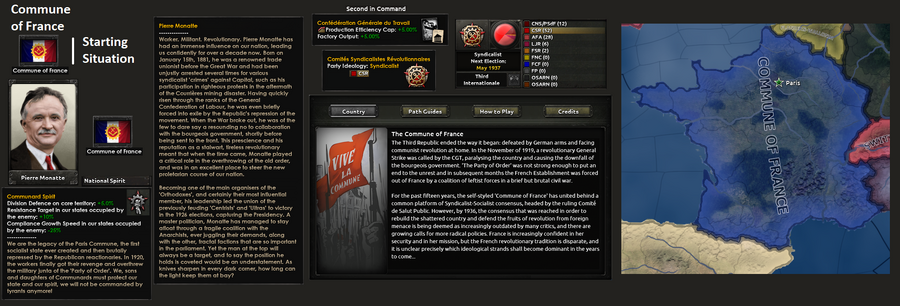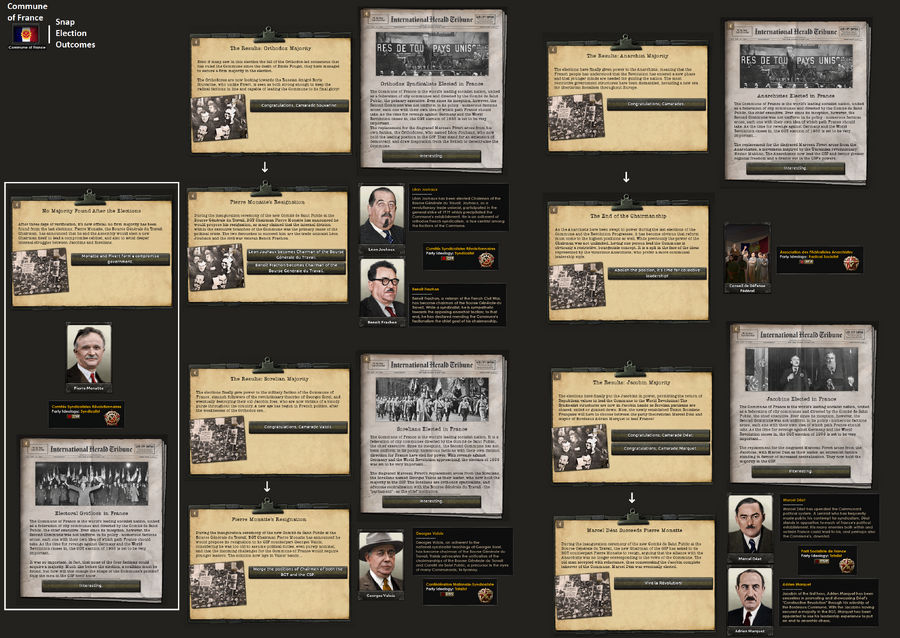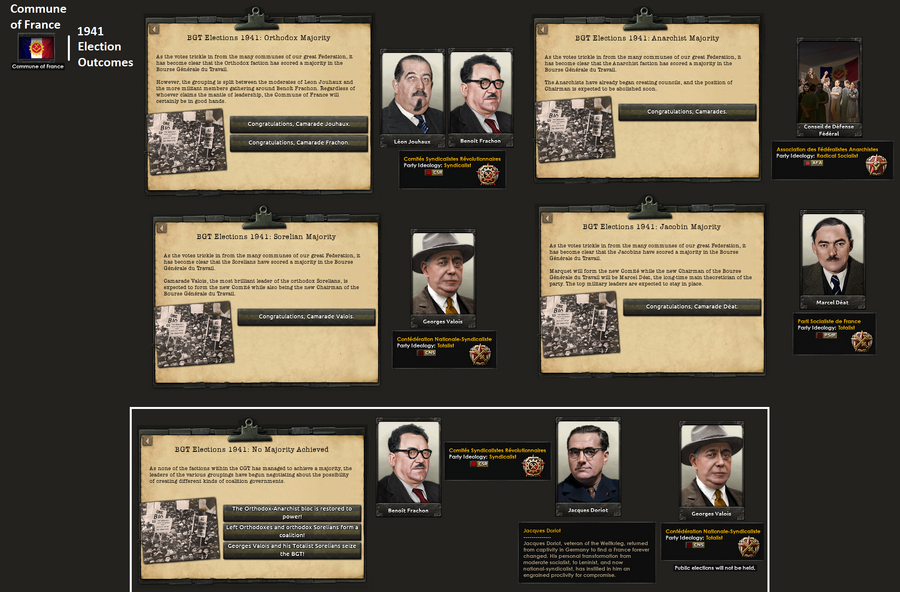The Commune is a Federal Syndicalist Semi-Presidential Republic composed of 36,000 communes. The Head of State is the Chairman of the Bourse Générale du Travail (BGT, General Labor Council – the country’s legislature), currently held by Pierre Monatte of the Comités Syndicalistes Révolutionnaires (Revolutionary Trade Union Committees, CSR), while the Head of Government is the Chairman of the Comité de Salut Public (CSP, Committee of Public Safety – the country’s cabinet), headed by Marceau Pivert, also of the CSR.
1936 Elections[]
In early 1936 members of the BGT opposed to his non-action/response to labor crackdowns in the German Empire, will successfully vote on a motion of no confidence against CSP Chairman Pivert and his government, and he will be forced to call early elections to the CSP starting in one week’s time.

1936 Election Events
Over the next five days (a little under two weeks in game) five events will take place setting security matters and electing a few positions (officially titled Delegate for…,) of the CSP. Four parties spread over three ideologies will compete for the posts:
- The Orthodoxes: The Comités Syndicalistes Révolutionnaires (Revolutionary Trade Union Committees, CSR) - Syndicalist: Established in 1925 in the wake of the British Revolution, it seeks to follow the British in supporting democratic methods.
- The Anarchists: Association des Fédéralistes Anarchistes (Association of Anarchist Federalists, AFA) – Radical Socialist: Supports devolution and regional freedom for local communes. Inspired by the Ukrainian Nestor Makhno.
- The Sorelians: Confédération Nationale-Syndicaliste (National-Syndicalist Confederation, CNS) – Totalist: Supports centralization of the state by moving power away from the CSP and into the BGT. Named after and takes inspiration from French anarcho-syndicalist thinker Georges Sorel.
- The Jacobins: Parti Socialiste de France (Socialist Party of France, PSdF) – Totalist: Leninists who want to become a vanguard party for France and rid it of the AFA and CSR. Named after the republican Jacobins of the French Revolution.
If one of the parties is able to secure three or more of the votes, it will win a majority and can form the next government. The winning faction will get to choose the new Chairman for the CSP, and will (in all cases but one) replace Monatte as Chairman of the BGT.
- If the Orthodox CSR wins a majority, Monatte will concede to the fact that having two different parties controlling the Chairmanships of the CSP and BGT (a cohabitation) may have caused the political crisis, and resign. The CSR will have two options to succeed him: moderate trade unionist Léon Jouhaux or French Civil War veteran and militarist Benoît Frachon.
- If the Anarchist AFA wins a majority, the BGT Chairmanship will be abolished and collective leadership will take over: Conseil de Défense Fédéral (Federal Defense Council).
- If the Sorelian CNS wins a majority, it will immediately purge its rival Jacobin faction, and its leader, Georges Valois will take over as Chairman of the CSP. Citing old age, Monatte will resign as Chairman of the BGT, and instead of replacing him Valois will merge it with that of the Chairman of the CSP, creating one centralized Chairmanship with himself as its head.
- If the Jacobin PSdF wins a majority, it will also immediately purge its rival Sorelians faction. Theoretician Marcel Déat or Mayor of Bordeaux Adrien Marquet will be named the new Chairma of the CSP. Monatte will be asked to resign, saying the alliance with the Anarchists is no longer needed/wanted. Whichever leader was not made Chairman of the CSP will become the new Chairman of the BGT.
- It could arise that none of the parties get a majority of the votes to win. If this happens, the current Orthodox – Anarchist pact will continue with both Monatte and Pivert getting to stay in their respective offices.

Adopting a New Flag?
Note that if one of the Totalist factions win in 1936, as it purges its rival faction, it will be the only available Totalist party for all succeeding elections.
Any party except the Jacobins will get the chance to change the Commune’s flag over a week after the new government is installed. The Conseil de Défense Fédéral’s portrait will change based on the flag chosen.
Jacobin Revolu... Reformation[]
If the Jacobin faction won the majority in 1936, it will have the chance to bring to the Commune the revolution it has been working so long for. Choosing to sweep away the old system will see the syndicalist structure, from which the Commune was founded and built upon, torn down and replaced by a 'Technician State:'
- The Commune will be reorganized into the French Social Republic.
- The Jacobins will be reformed into the Union Socialiste Républicaine (Republican Socialist Union, USR). As the Jacobins see themselves as a vanguard party (de Parti Unique (Single Party)), there will be no need for elections and ones scheduled to take place in February of 1941 will be cancelled.
- The Bourse Générale du Travail will be reformed as the Congrès des Téchniciens (Congress of Technicians) and the Comité de Salut Public will be replaced by the Conseil des Ministres (Council of Ministers).
- The Jacobin leader who was named Chairman of the new defunct CSP will become the Second-in-Command once the Confédération Générale du Travail (General Confederation of Labour, CGT) the country’s trade union is disbanded.
Léon Blum, now leader of the CSR*,* will openly call for a united opposition to the USR, and form the Front Populaire (FP, Popular Front). Security services fearful of Blum and the FP’s power insist the government arrest and prosecute him, along with any other FP leader, including the former Army Chief of Staff Maurice Gamelin.
- If brought to trial, it will be held in the capital and aptly named the Paris Trials. The defendants will get sympathetic coverage in both foreign and even some domestic newspapers, so much so leaders in the USR suggest to cancel the Trials altogether. If it is seen through, the only acceptable verdict will be death and the defendants will be executed. Paris will burn in a last chance FP revolt, but as it is now leaderless the revolt will fail.
- If instead the Trials never happened or were canceled, Gamelin will mutiny, gather loyal units to his cause, and lead a successful March on Paris. The Jacobin USR will be purged, and Gamelin and Blum will restore the old syndicalist order: the CGT will be re-established, Maurice Gamelin will become Chairman of a reconstituted BGT, and Blum will become the Chairman of the reconstituted CSP. They will hold office until the 1941 elections.
1941 Elections[]

1941 Election Events
The 1941 elections are held similar to 1936. A number of policies will be voted on, and whichever party has the majority will win, or if none will end in a deadlock. It is possible that no Totalist factions participate if the Jacobins won in 1936 (purging the Sorelians) and were later couped by Gamelin (thereby also being purged). On the other hand, it is also possible both can participate if neither won in 1936.
If Valois is Chairman at the time of the elections and the Commune finds itself at war with Germany, he may unilaterally cancel the elections and any future ones and stay in power. A few days later he will be able to change the flag of the Commune to its reintroduced war banner.
- If the Orthodoxes win a majority, same as 1936, either moderate trade unionist Léon Jouhaux or French Civil War veteran and militarist Benoît Frachon will be elected Chairman of the BGT.
- If the Jacobins win a majority, Marcel Déat will take over as the Jacobin leader and will be elected the Chairman.
- If the Sorelians win a majority, its leader, Georges Valois will be elected to both Chairman of the CSP, and concurrently Chairman of the BGT.
- Finally, if the Anarchists win a majority, the collective Conseil de Défense Fédéral will be set up.
- It could arise that none of the parties get a majority of the vote to win. If this happens there are three outcomes:
- The Orthodox-Anarchist bloc is reformed, with Orthodox Benoît Frachon being elected Chairman of the BGT.
- Left Orthodoxes and moderate Sorelians form a bloc, with Orthodox Jacques Doirot elected Chairman.
- The Sorelians seize the BGT and declare themselves the winners, elevating leader Georges Valois to Chairman of the BGT. Elections will no longer be held.
1946 Election[]
The 1946 elections will only focus on one issue: the reintegration of social democrats who were pushed out over a decade ago. There is no room for error in the election, ie. a party will always win a majority:
- The Orthodox, who want to welcome the SDs back, will elect moderate trade unionist Léon Jouhaux as Chairman.
- All other parties don’t support the SDs: The Jacobins will elect Marcel Déat, the Sorelians Georges Valois, and the Anarchists the Conseil de Défense Fédéral.
1951 Election[]
The final election, held in 1951, 30 years since the founding of the Commune will, like the 1946 election, focus solely on a single issue: what can the Commune due to improve des droits de l'homme et du citoyen (the Rights of Man and of the Citizen)? There is no room for error in the election, ie. a party will always win a majority:
- The Orthodoxes will push for the democratization of the Commune, and will elect Vincent Auriol as the Chairman of the BGT.
- The Sorelians, still pushing their Totalist line, will elect leader George Valois as Chairman.
- The Anarchists, still fighting for the stateless society, will, set up the Conseil de Défense Fédéral.
- Finally, the Jacobins, still pushing their Revolutionary line, will elect Marcel Déat as Chairman.







